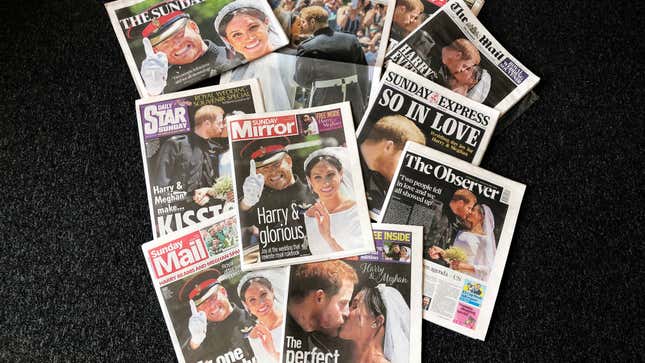Can Harry and Meghan Escape Their Endless Tabloid War?
In Depth

Harry and Meghan are settled somewhere in a “secluded compound” in Los Angeles, waiting out the coronavirus. Their new life is already in motion, with both an ocean and a continent between them and their old existence. They’ve announced the name of their new foundation, “Archewell,” and they’ve been delivering meals as part of relief efforts, accounting for their first media sighting in L.A. But their business across the pond isn’t finished, after all; it turns out they’re still locked in the fight that has consumed so much of their existence as a couple in the public eye—a battle with the British tabloid press which, it seems, isn’t quite over yet.
Whatever their plans before the covid-19 pandemic upended society, Harry and Meghan have been keeping a comparatively low profile. Beyond announcing their new foundation name—after the Telegraph uncovered their trademark application—they’ve kept a low profile. “This isn’t the right time to be making any big announcements, they feel awkward because this news has broken at a time when they want everyone’s attention to be on the pandemic,” a “source connected to the charity,” told Vanity Fair. After a flurry of excitement about Meghan’s first splashy interview after leaving the ranks of working royals for Good Morning America, it turned out the segment was a bit of a letdown, just a months-old press clip to promote her Disney documentary Elephant—a never-before-seen exclusive, sure, but nothing earth-shattering.
Which makes their fuck-you letter to four prominent British tabloids that much more of a bombshell.
Sunday night, Harry and Meghan sent a letter to the editors of the Sun, Daily Mail, Mirror and Express, expressly cutting the publications off from any information about their doings. “The Duke and Duchess of Sussex will not be engaging with your outlet,” the letter announced. “There will be no corroboration and zero engagement.” They added that the ban is specific to the publications that received the letter, their Sunday editions, and their online operations; the pair expressed their support for press freedom and their desire to work with journalists worldwide in the future. “What they won’t do is offer themselves up as currency for an economy of clickbait and distortion.”
-

-

-

-

-

-

-

-

-

-

-

-

-

-

-

-

-

-

-

-

-

-

-

-

-

-

-

-

-

-

-

-

-

-

-

-

-

-

-

-








































